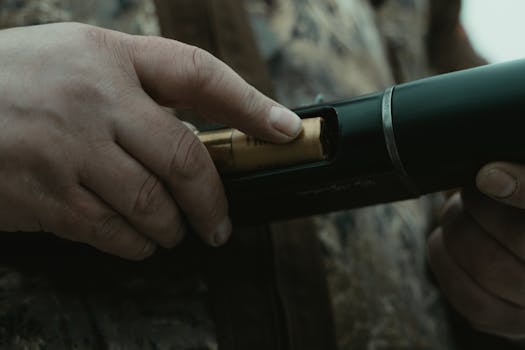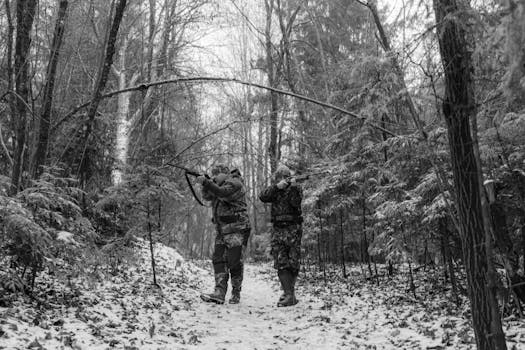The evolution of hunting has experienced a remarkable transformation over the years, particularly with the advent of digital tools. These advancements are reshaping how enthusiasts approach the sport, providing a blend of tradition and technology.
Understanding the impact of digital tools on hunting is essential for both novices and seasoned hunters. By embracing innovation, hunters can enhance safety, efficiency, and effectiveness while in the field.
This article explores various digital tools that have changed the hunting landscape, highlighting their advantages and possible drawbacks. Let’s delve into how technology is influencing this beloved pastime.
The Role of GPS in Hunting
GPS devices have revolutionized how hunters navigate in the wilderness. They offer precise location tracking, ensuring hunters can easily find their way back to safety.
Moreover, GPS technology aids in identifying hunting zones and managing land boundaries. This capability helps prevent trespassing and promotes responsible hunting practices among users.
Additionally, many GPS units include features for route mapping and waypoints. This aids hunters in plotting their journeys, ultimately improving their time in the field.
Some modern GPS devices also have the option to share locations with fellow hunters. This feature fosters team collaboration, enhancing group hunting experiences and safety measures.
As a result, GPS technology ensures that outdoor enthusiasts can explore diverse terrains confidently. Overall, the integration of GPS represents a significant advancement in hunting methodologies.
Smartphone Apps and Their Hunting Benefits
Smartphone applications have become essential tools for hunters, offering a plethora of features. They assist in everything from weather tracking to game calls, enhancing every hunting trip.
Apps provide vital weather updates, helping hunters plan their outings based on conditions. This information can be critical, especially during unpredictable weather patterns.
Moreover, many apps offer tracking features for harvested game. This helps hunters keep a record, making it easier to assess their hunting performance over time.
Tools like digital game calls can mimic actual animal sounds, attracting desired species. This technological enhancement often leads to more successful hunts and improved hunting techniques.
As smartphone technology continues to evolve, more hunting-specific features become available. Such advancements promise even greater efficiency for hunters looking to optimize their experience.
The Contribution of Drones to Hunting
Drones have emerged as innovative tools, offering unique perspectives for hunters. Their aerial views provide comprehensive insight into animal movement across vast landscapes.
With the ability to survey large areas quickly, drones help hunters identify potential hotspots. This information becomes invaluable when planning hunting strategies and conserving time.
Furthermore, drones can assist in locating game after a successful shot. This feature saves valuable time and effort when tracking down blood trails or injured animals.
It’s essential, though, to understand the regulations surrounding the use of drones in hunting. Compliance with local laws ensures ethical practices and maintains the integrity of the sport.
Ultimately, as drone technology becomes more accessible, they will likely play a larger role in the future of hunting. This trend may redefine traditional hunting practices in exciting ways.
The Impact of Online Communities on Hunting Knowledge
Digital platforms have fostered thriving online communities, connecting hunters worldwide. These forums provide spaces for sharing experiences, tips, and best practices in the field.
Such communities give hunters access to a wealth of collective knowledge. This information aids both novices and veterans in honing their skills and understanding of hunting techniques.
Moreover, social media channels allow hunters to showcase their successes. Sharing these moments not only inspires others but also builds camaraderie within the hunting community.
Online videos and tutorials further enhance learning opportunities. Visual demonstrations of techniques or equipment usage contribute significantly to the independent learning process for many hunters.
As these communities continue to grow, the sharing of knowledge will likely lead to improved conservation practices. This shift promotes sustainable hunting habits and a deeper respect for nature.
Trail Cameras: Monitoring and Enhancing Success
Trail cameras have transformed scouting practices for hunters, providing invaluable data. These devices capture images of wildlife, allowing for more informed hunting decisions.
By monitoring deer movement patterns, hunters can determine the best times to set up. This intelligence ultimately increases the odds of a successful hunt.
Additionally, some trail cameras feature advanced technologies like infrared sensors. This capability ensures clear images at all times, providing comprehensive data throughout the day and night.
Moreover, modern trail cameras can transmit real-time images and videos to smartphones. This invites hunters to analyze data remotely, making adjustments to their strategies as necessary.
Overall, the integration of trail cameras into hunting practices ensures a thoughtful and strategic approach. The efficiency gained is undeniable, amplifying the sport’s enjoyment.
Virtual Reality and its Role in Hunting Education
Virtual reality (VR) technology is making waves in various fields, including hunting education. It provides immersive experiences that can enhance skills without leaving home.
Through VR, users can practice techniques, middle game calls, and even learn about local wildlife. This level of engagement is unrivaled and offers a unique educational opportunity.
Moreover, these simulations can adjust their difficulty levels, catering to all skill types. This inclusivity enhances the learning experience and allows users to progress at their own pace.
As VR technology continues to improve, it may become an essential part of hunting training programs. Such innovations could reduce the learning curve for newcomers entering the world of hunting.
Beyond skills, VR also educates about ethical hunting practices. This is crucial in fostering a mindset of conservation and respect for wildlife among new hunters.
Ethical Considerations and Challenges of Digital Tools
While digital tools enhance hunting experiences, they also raise ethical questions. The responsible use of technology ensures that traditional values remain intact amidst advancements.
For instance, relying too heavily on technology may detract from the skills and instincts necessary for hunting. Balancing digital aids with hands-on experiences is vital to preserving the essence of the sport.
Moreover, some digital tools, like drones, may infringe on fair chase principles. This calls for a consensus within the hunting community on acceptable practices and regulations for technology use.
Furthermore, as digital tools proliferate, poaching becomes a concern. Implementing strict guidelines and educating hunters on ethics can help mitigate such risks.
Ultimately, navigating the challenges posed by technology requires collective effort. Striving for a balance between progress and tradition ensures the sport remains thriving and respected.
Conclusion
The impact of digital tools on hunting is significant, creating opportunities for improved practices and greater success. As technology continues to evolve, so too will the methods and experiences of hunters.
Embracing these tools while maintaining ethical standards ensures progress in the hunting community. Ultimately, the fusion of tradition and technology can lead to a rewarding experience for current and future generations.
As hunters adapt to changing landscapes, they can foster a deeper connection with nature. This growth can not only enhance their skills but also promote conservation efforts for sustainable hunting.
In conclusion, digital tools are reshaping the hunting experience, providing a blend of efficiency and excitement while ensuring responsibility and respect for wildlife. The journey of embracing technology promises great potential in preserving the legacy of hunting.


